Burchard Scholars Program by Chris S. '11
(old time stamp: 11-21-09) - this entry is five months late >___<"
QUOTE:
(talking about her daughter when she lived in McCormick as a Housemaster)
“As you know, young children play these imaginative formative games when they are growing up, like playing house and things like that. When my daughter was living in McCormick, I asked her one day what she was planning on doing today.
She told me, ‘My Physics pset.’”
-Professor Margery Resnick, Professor in Foreign Language and Literature, Burchard Scholars Program Coordinator.
I’ve been meaning to write about Burchards for awhile, but I always thought, “well, I’ll just write about it when it finishes.” So this last Wednesday (note: back in November 2009, hahaha) we had our final session for our tenure as Burchard Scholars, and I think it’s about time.
I’ve alluded to the Burchards program on and off in many of my old blogs, but I never wrote about it in a single place. So here goes:
The Burchard Scholars Program is a dinner-seminar program initiated by the School of Humanities, Arts, and Social Science at MIT. Every month, Professor Resnick invites a member of the department to provide a 40-minute seminar in their field of research to the group of 30-40 Burchard Scholars over dinner.
The best part of the program is that the lectures are so eclectic and wide-ranging that you’re bound to learn something new at every seminar. The list of the seminars that was in this cycle is attached:
Fall 2009
Noel Jackson – Associate Professor, Literature
“The Humanities as Half-Knowledge: Two Romantic-Period Examples.”
Haimanti Roy – Assistant Professor, History
“Borderline Citizens: Becoming ‘Indians’ and ‘Pakistanis’ in Post-Partition Bengal, 1947-56”
David Jones – Assistant Professor, Program in Science, Technology, and Society
“Do Doctors Make Good Decisions? History and the Complications of Cardiac Surgery”
Ben Olken – Associate Professor, Economics
“The Economics of Corruption”
Spring 2009
Taylor Fravel – Associate Professor, Political Science
“Three Perspectives on China’s Rise: Threat, Opportunity, or Menace?”
Yo Yo Ma РMultiple Grammy®-winning cellist, Special Burchard Event
Performance with the Silk Road Ensemble at Symphony Hall
Dr. Thomas Byrne – Clinical Professor of Neurology
“Mirror Neurons: Impact on Learning, Empathy and Theory of Mind”
George Ruckert – Senior Lecturer, Music and Theater Arts
“The Sarod and the Raga in North Indian Tradition”
—–
So the seminars were phenomenal. Last semester, Professor Fravel gave an interesting perspective on China-Taiwan relations, having spent many years in Taiwan (he actually attended my high school’s rival school: Taipei American School).
In March, we had an extremely rare opportunity arranged by Professor Lindgren of the Music Faculty for us to all attend a Yo-Yo Ma concert at Symphony Hall in Boston. Yo-Yo Ma was playing with the Silk Road Ensemble, and we were treated to a luxuriously exotic medley of unique instruments from the East (just check out the kinds of instrument the members of the Ensemble play on the webpage!).
After the event, Professor Lindgren arranged a “back-stage visit” for us to see Yo-Yo Ma, and there was a massive photo flurry. I didn’t get to be in the pictures since I was taking the pictures, but Yo-Yo Ma did sign my program! :)
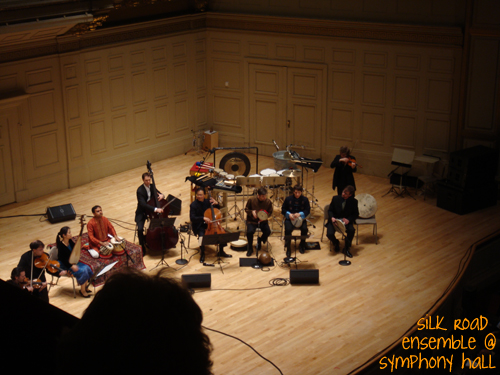
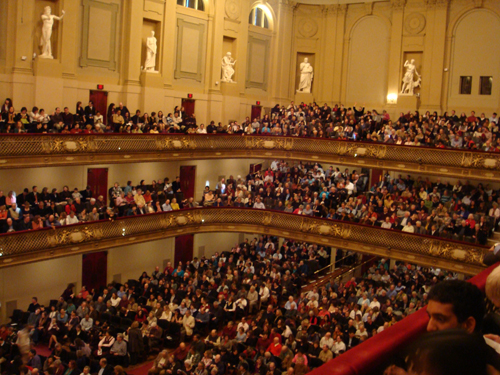
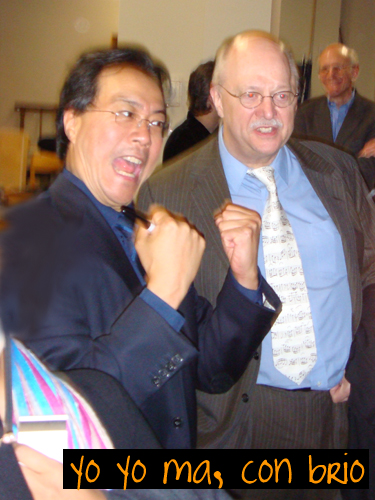
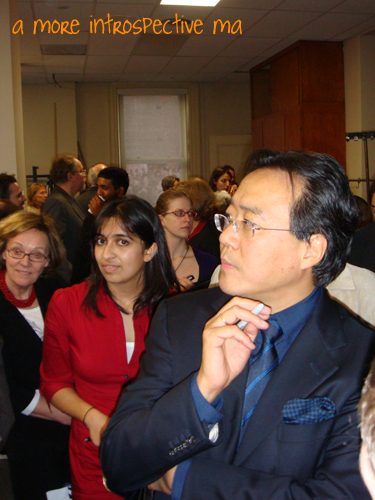
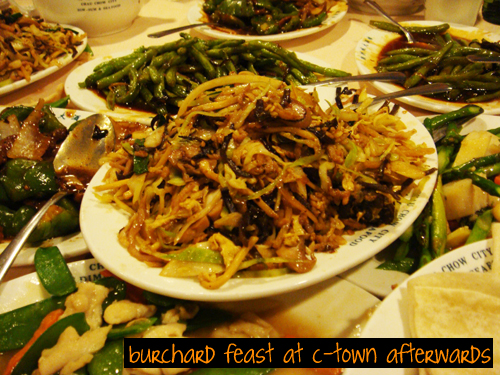
Each of these dinner-seminars begins with a feature lecture by the professor invited, and then dinner where the subject matter is discussed in greater detail, followed by questions and answers over coffee and dessert. In the words of Professor Resnick (the coordinator of the program), Burchards is designed to be an “intellectual feast of the greatest minds in humanities at MIT.”
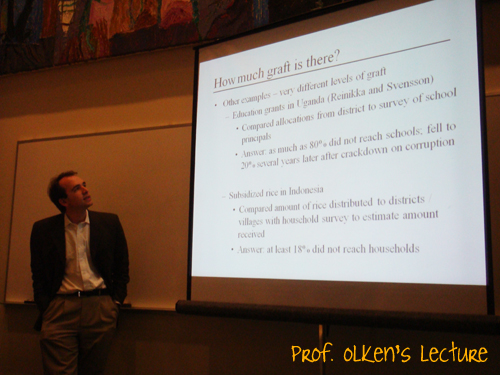
But the physical food has not been too shabby either. :)
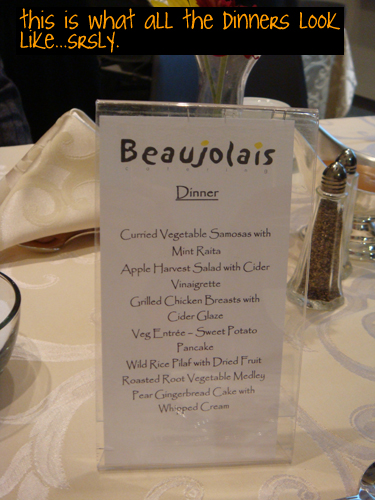
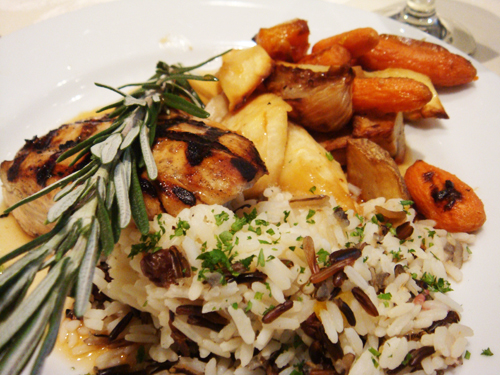
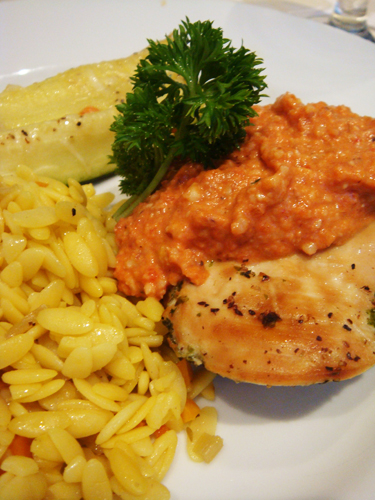
What I really loved about Burchards is that it gathers a group of students passionate in the humanities in a small-knit gathering of students, and exposes us to the breath of humanities research that exist at MIT.
Many MIT students and even administrators dismiss the humanities as secondary to the Institute’s long-ranging goals, but I find that nothing can be further from the truth. Although many students dismiss the humanities and the arts as frivolous forays into realms that yield no concrete “truth,” what the humanities offer is an alternate lens to life and the world around us, and a new venue of thought and rationale of our place in the world.
In the first Burchard lecture of the 2009 Burchard Scholars program, Professor Jackson argued in his expose that the field of humanities can be viably described as “half truths” –
Whereas Plato regards this kind of poetic thinking as useless and worse, however, we find in these poems a qualified defense of not-knowing, and a concomitant claim on behalf of what the poet John Keats called “half-knowledge.” Both poems make a brief for the importance of attending to thoughts principally characterized by their incompletion and open-endedness; they embrace a kind of thinking that pointedly does not resolve into determinate knowledge. And both paradoxically ask us to accept, if only provisionally and for a time, this half-knowledge as a kind of fulfilled and complete knowledge in its own right.
Although the purpose of the humanities was never structured to “problem-solve” in the same sense that it is taught in science classes, it does nonetheless provide a new channel of thought – to allow ourselves to ask profound questions, to challenge us to look beyond horizons that have defined and measurable answers –
I want to suggest that the very ground on which Plato and many since have dismissed the humanities is in another view the basis for the enduring and vital importance of the humanities today. It is worth remembering that problem solving – the activity prized above all others at an institution such as MIT – is made possible only through the prior activity of problem making. Problem making begins with the recognition that there are questions that have yet to be asked, latent possibilities that remain unexplored. And this, ultimately, is where the humanities may have most to offer us. What may seem like the mere multiplication of “uncertainties” and “doubts” might equally serve as a conduit to new thoughts, fresh insights, and creative solutions.
(the full text of Professor Jackson’s lecture at the Burchard Scholars Seminar may be found here.)
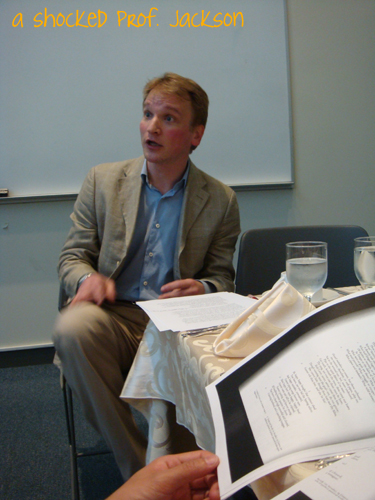
During my tenure as a Burchard Scholar, I came to realize the breath and scope of the humanities department at MIT, and claims that “MIT is a one-dimensional science and technology school” are simply not true. Over the next two weeks, before prefrosh commit on May 1, I will be writing a series of blogs of students of humanities at MIT, featuring guest blogs from 21H (history) and 21M (music) majors here. I have also declared a double history major at MIT this semester, and so I will also write a little bit more about my reasons in doing so.
—–
For current students, I strongly encourage you to apply to Burchards if you have a strong interest in the humanities –
http://shass.mit.edu/undergraduate/scholarships/burchard
The Burchard Scholars Program runs on the calendar year, rather than the academic year. Therefore, participants are selected from an application process beginning in the fall (normally October/November-ish). Scholars are announced in December, and the lecture series begin during the spring semester and continuing through the next fall semester. There is one lecture per month, generally.
The program is only open to sophomores and juniors at the time of application. The application consists of an essay, and a recommendation by a HASS faculty.
Chris, are the bvloggers going to answer these qestions about this “SPECIAL INTELLIGENCE DIVISION” we supposedely have at mit? our CIA-ish “hacking intellligence and counter intelligence” team? It seems to have leaked.
lol and pardon my typing/spelling, please!
SECOND! Great post chris! So funny when you said this:”(he actually attended my high school’s rival school: Taipei American School).” The prof must have been very interested to meet you…LOL.
“Every month, Professor Resnick invites a member of the department to provide a 40-minute seminar in their field of research to the group of 30-40 Burchard Scholars over dinner.”
HASS professors have research? lol
This looks terrific. I have to say that you bloggers do a terrific job of beautiful food photos, which could lull other parents like me into complacency re: the food choices at MIT. IN REALITY THE FOOD CHOICES AT MIT ARE ABYSMAL.
Your child WILL do her physics PSETS, but she will be doing it with fast food, no food or a bowl of cereal.
LOVING THIS! I was really worried about the humanities at MIT.. this is definitely helping me
“Your child WILL do her physics PSETS, but she will be doing it with fast food, no food or a bowl of cereal.”
-Really? ARGH!!!!!! Just when I was getting hopeful…LOL. Can I get a second opinion on this? Preferably from a CURRENT MIT student?
breadth (of humanities…) not breath
see I still read your blog!
@ genius, are you really? What;s your actual IQ test score?
Specify which test (wechsler, standford binet, etc), what deviation,and what edition.
I have dyslexia and ADHD rather severely[took a while to type this and I had many errors to fix],which impacted my school performance, but I’ve tested a 167 stanford-binet LM (sd16), have an auditory digit memory span of 25, and started talking at 7 months, sentences by 12.
A lot of people like to proclaim genius because they can test at a 130s/140s level, but I consider real genius starts at around , maybe, 160+ish (sd 15.)Would this actually describe you?